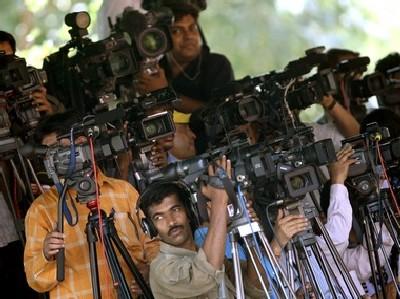Photographs: Reuters Vanita Kohli-Khandekar in New Delhi
Why this kolaveri di? The Tamil/English hit song roughly means: "Why this rage, girl?" It is a question that the news media is increasingly asking as everyone seems to be piling on to it.
From disparaging remarks from the Press Council chairman, to a possible Rs 100 crore (Rs 1 billion) fine for a channel, to a government pushing for more content regulation -- everyone, it seems, is out to get the media.
The feeling of persecution has been captured well by last week's Outlook magazine cover: "Why does everybody hate the media?"
Do they? Are we getting somewhat blinded by television news channels and an English press that is obsessed with itself? Have we forgotten how to wield the power of media with responsibility? And every time someone reminds us, we bristle.
...
Why are all eyes on the media industry?
Think about it. What has happened really? There have been some raps on the knuckles for news channels, but largely the industry does its own thing. India remains one of the most liberal and largest TV news markets in the world, with 132 channels.
News commands a rock-steady eight per cent of total television viewing time across India, going by TAM numbers. It is a terrifically unprofitable business to be in, but many people who want to own a news channel do not care about making money.
Newspapers, on the other hand, remain the most profitable media segment to be in, with operating margins for most groups holding steady at 25 to 30 per cent, double those of television. From a censure angle, too, newspapers get away with a lot.
Many newspapers were discovered to be charging money to write about politicians and their parties in the 2009 general elections. When the "paid news" scandal broke in 2010, most newspapers named in a report escaped any censure or penalty.
...
Why are all eyes on the media industry?
Image: Times Now is facing a Rs 100 crore (Rs 1 billion) fine for showing picture of the wrong judgeThis is unlike Times Now, which is facing a Rs 100 crore (Rs 1 billion) fine for showing picture of the wrong judge.
So television news channels, it seems, are at the core of this whole feeling of kolaveri about the media. This is because standards in journalism, especially on TV, have fallen.
From two or three Hindi channels doing nonsensical stories about the coming apocalypse, several in Telugu, Tamil, Marathi or Kannada are doing some pretty grotesque stuff -- some of it clearly cooked up.
This has been documented ad nauseum; not just by English newspapers obsessed with television news but also by films that regularly lampoon news television.
...
Why are all eyes on the media industry?
There are many reasons for this fall: hyper-competition, non-serious players and non-member news channels that do not follow the self-regulation code laid down by the News Broadcasters Association.
The biggest reason, however, is that media owners, managers and editors have chosen to look the other way, and blame everything else except their own inability to deal with growth. This includes two things.
The first is training. It sounds very tame, but hear me out. In television most raw recruits are thrown in at the deep end. Ask a senior editor in any major newspaper or magazine how much time he or she gets to write.
The job of handling a full team, training them on the job and getting pages out every day takes up the full day and more. So there is no time for most editors to write.
...
Why are all eyes on the media industry?
Most famous TV journalists refuse to fade off screen even after they become managing or group editors. They stay right there on prime-time news bulletins and top-rated talk shows. Where, then, is the time to train anyone?
Take the second inability. Television news channel owners and managers have shown no spine whenever the government stepped into their territory. For instance, the "five violations and we will not renew your licence" change in the new uplink/downlink policy is bad for news broadcasters.
But can you imagine owners doing a dharna at India Gate or Mantralaya? They won't. They can't even sit down together to discuss industry issues, forget fighting a government for potentially snatching their licence.
...
Why are all eyes on the media industry?
Newspaper owners, on the other hand, have a history of working together, fighting and lobbying the government. Regulators think ten times before making any policy changes that could upset newspaper owners. But television is a free-for-all.
If goodwill could be kept in a bank account, television news media's would be running pretty low these days. It has exhausted all the positive feeling anyone had for it for breaking corruption scandals or getting murderers booked.
It has nothing to trade with -- with the government, with other media, or with its viewers. And there seems no other way of earning it back except the long hard one -- of investing in content.








article